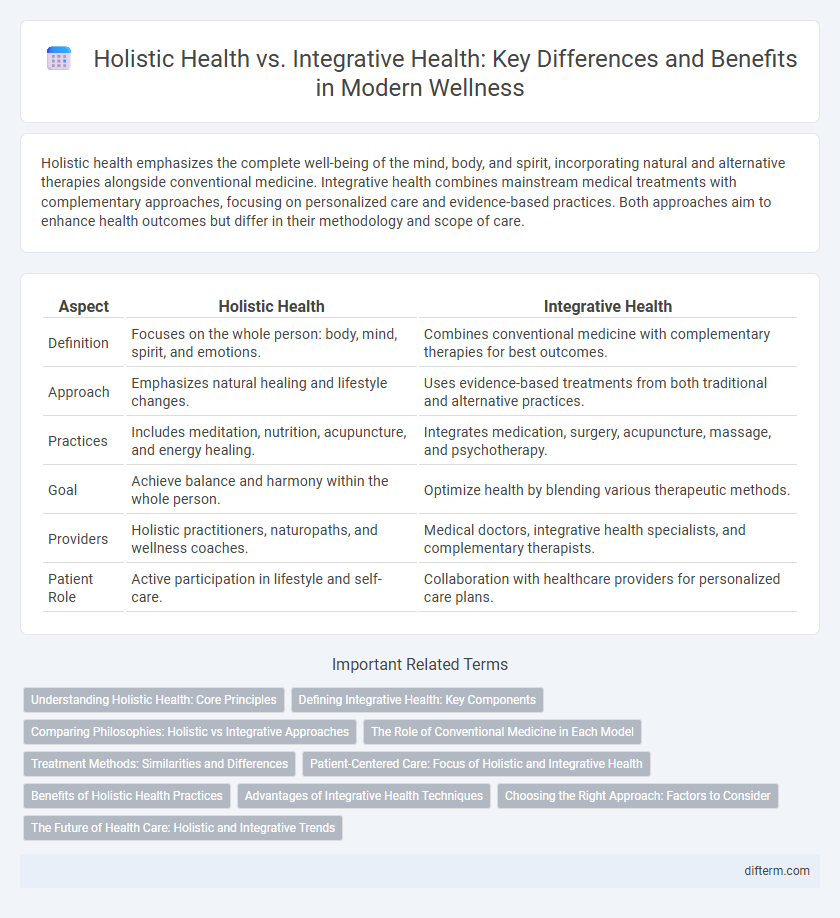Holistic health emphasizes the complete well-being of the mind, body, and spirit, incorporating natural and alternative therapies alongside conventional medicine. Integrative health combines mainstream medical treatments with complementary approaches, focusing on personalized care and evidence-based practices. Both approaches aim to enhance health outcomes but differ in their methodology and scope of care.
Table of Comparison
| Aspect | Holistic Health | Integrative Health |
|---|---|---|
| Definition | Focuses on the whole person: body, mind, spirit, and emotions. | Combines conventional medicine with complementary therapies for best outcomes. |
| Approach | Emphasizes natural healing and lifestyle changes. | Uses evidence-based treatments from both traditional and alternative practices. |
| Practices | Includes meditation, nutrition, acupuncture, and energy healing. | Integrates medication, surgery, acupuncture, massage, and psychotherapy. |
| Goal | Achieve balance and harmony within the whole person. | Optimize health by blending various therapeutic methods. |
| Providers | Holistic practitioners, naturopaths, and wellness coaches. | Medical doctors, integrative health specialists, and complementary therapists. |
| Patient Role | Active participation in lifestyle and self-care. | Collaboration with healthcare providers for personalized care plans. |
Understanding Holistic Health: Core Principles
Holistic health emphasizes the interconnectedness of mind, body, and spirit, promoting balance and wellness through natural therapies and lifestyle adjustments. It prioritizes prevention by addressing emotional, social, and environmental factors influencing overall health. Core principles include personalized care, self-healing, and recognizing the whole person rather than isolated symptoms.
Defining Integrative Health: Key Components
Integrative health combines conventional medicine with evidence-based complementary therapies to address the whole person--body, mind, and spirit. Key components include patient-centered care, use of multidisciplinary treatments, and emphasizing both prevention and well-being. This approach enhances healing by integrating nutrition, stress management, and lifestyle adjustments alongside traditional medical interventions.
Comparing Philosophies: Holistic vs Integrative Approaches
Holistic health emphasizes treating the entire person--mind, body, and spirit--recognizing the interconnectedness of physical, emotional, and environmental factors. Integrative health combines conventional Western medicine with evidence-based complementary therapies to optimize overall well-being and address specific health conditions. Both approaches prioritize patient-centered care but differ in methodology, with holistic health focusing on prevention and balance, while integrative health aims to enhance traditional treatments through a multidisciplinary framework.
The Role of Conventional Medicine in Each Model
Conventional medicine serves as the foundation of integrative health, complementing alternative therapies with evidence-based treatments to address physical symptoms and disease. In holistic health, conventional medicine is one component within a broader approach that emphasizes mental, emotional, and spiritual well-being alongside physical health. Both models value conventional medicine but differ in how it is integrated and balanced with complementary practices to achieve overall wellness.
Treatment Methods: Similarities and Differences
Holistic health emphasizes treating the whole person--mind, body, and spirit--using natural therapies like acupuncture, nutrition, and mindfulness to promote overall wellbeing. Integrative health combines conventional medical treatments with complementary approaches such as chiropractic care, herbal medicine, and stress management to address specific health conditions. Both prioritize patient-centered care and prevention, but holistic health leans more toward natural methods, while integrative health incorporates evidence-based conventional medicine alongside alternative treatments.
Patient-Centered Care: Focus of Holistic and Integrative Health
Holistic health emphasizes treating the whole person--mind, body, and spirit--while integrative health combines conventional medicine with complementary therapies to enhance patient outcomes. Both approaches prioritize patient-centered care by tailoring treatments to individual needs, preferences, and values, promoting active patient participation and empowerment. Effective care plans in holistic and integrative health improve overall well-being through personalized strategies that address physical, emotional, and social health factors.
Benefits of Holistic Health Practices
Holistic health practices emphasize the integration of body, mind, and spirit, promoting overall well-being by addressing physical, emotional, and spiritual needs simultaneously. These approaches often include mindfulness, nutrition, yoga, and acupuncture, which can reduce stress, improve immune function, and enhance mental clarity. Embracing holistic health supports long-term lifestyle changes that foster balance and resilience, contributing to sustained health improvements beyond conventional treatments.
Advantages of Integrative Health Techniques
Integrative health techniques combine conventional medicine with evidence-based complementary therapies, enhancing patient outcomes through personalized care plans that address physical, emotional, and spiritual well-being. These methods improve chronic disease management, reduce reliance on pharmaceuticals, and promote preventive care by incorporating nutrition, mindfulness, and physical activity. Integrative health fosters collaboration among healthcare providers, resulting in comprehensive treatment strategies that support long-term health and resilience.
Choosing the Right Approach: Factors to Consider
Choosing between holistic health and integrative health depends on individual needs, focusing on complete well-being versus combining conventional and alternative treatments. Holistic health emphasizes physical, mental, emotional, and spiritual balance, while integrative health merges evidence-based medical care with complementary therapies. Consider factors like personal health goals, openness to alternative methods, and the importance of scientific validation when selecting the best approach.
The Future of Health Care: Holistic and Integrative Trends
Holistic health emphasizes treating the whole person--mind, body, and spirit--using natural and preventive approaches, while integrative health combines conventional medicine with complementary therapies to enhance patient outcomes. Emerging trends in health care focus on personalized treatment plans that integrate holistic practices like mindfulness and nutrition with evidence-based medical interventions. Future health care models prioritize interdisciplinary collaboration, patient-centered care, and technology-driven tools to support comprehensive well-being and chronic disease management.
Holistic Health vs Integrative Health Infographic

 difterm.com
difterm.com